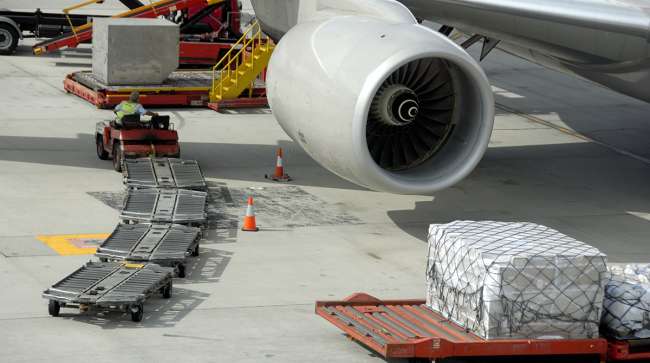Staff Reporter
Global, North American Demand for Air Cargo Drops

[Stay on top of transportation news: Get TTNews in your inbox.]
Battered by trade wars, global demand for air cargo decreased by 3.5% in October compared with the same month in 2018, according to a Dec. 4 report by the International Air Transport Association of Geneva.
North American air cargo did better, but still saw a decrease of 2.4%, the association reported.
The October results marked a weak start to the traditional peak season for air cargo. Plus, it was the 12th consecutive month of year-over-year declines in freight volumes, according to the association’s CEO, Alexandre de Juniac.
That said, the association also reported that freight capacity, measured in available freight-ton kilometers (AFTKs), rose by 2.2% year-over-year during the month.
North American airlines’ capacity increased by 3.1%. The report noted that the underlying strength of the U.S. economy has seen domestic air cargo outperform international cargo.
Overall, capacity growth has outpaced demand growth for the 18th consecutive month, the association said.
The report cited the ongoing trade war between the U.S. and China, deterioration in global trade and a broad-based slowing in economic growth as contributors for the cargo declines.
“Air cargo’s peak season is off to a disappointing start,” de Juniac said in the report. “Demand is set to decline in 2019 overall, the weakest annual outcome since the global financial crisis. It has been a very tough year for the air cargo industry.”
European airlines posted a 1.5% decrease in freight demand in October. Capacity increased by 2.8% year-on-year, the report said.
The link the report makes between the U.S.-China trade spat and declining air cargo volumes is appropriate, said David Dollar, an economist and senior fellow of foreign policy and global development at the Brookings Institution.
“I think the trade war that the U.S. is prosecuting against China naturally leads to decreasing trade,” Dollar told Transport Topics.
Dollar said the trade war is having surprising “spillover” effects throughout the global economy, and particularly on strong economic nations such as Germany and South Korea.
Dollar noted that China’s industrial sector had been growing before the trade spat, which he attributed to Chinese buyers acquiring equipment and machinery from Germany. But now, global business investment has largely gone negative, Dollar said, meaning there are fewer machine orders coming out of China. The negative effects trickle down to cargo, meaning less ship capacity is needed for large machines, and less air capacity is needed for machine parts and components, he said.
For UPS Inc., however, the only global downward trends last quarter were in the lanes of U.S.-Asian trade. In a statement to TT, UPS said its international segment for the financial quarter ended Sept. 30 had volume growth on internal European trade lanes and all Asia trade lanes except U.S.-Asia routes. It attributed the U.S.-Asia trade lane declines to the trade tensions between China and the U.S.
UPS ranks No. 1 on the Transport Topics Top 100 list of the largest for-hire carriers in North America.
FedEx declined to comment, citing an upcoming earnings report.
In other segments, the IATA said Asian and Pacific airlines saw demand for airfreight contract by 5.3%, but capacity increased by 0.6%, according to IATA.
Latin American airlines saw a 2.6% demand contraction. Latin American air-cargo capacity increased by 2.3% year-on-year.
African carriers posted the fastest growth of any region in October, with an increase in demand of 12.6%, the association reported. Strong trade and investment links with Asia contributed to the positive performance, according to IATA. African air cargo capacity grew 13.9%.
Want more news? Listen to today's daily briefing:


